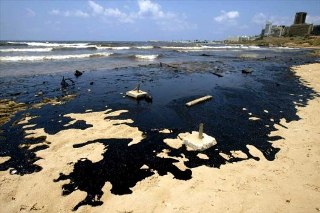Compensation for Lebanon Damage?

A December 2014 General Assembly (GA) resolution marked the first time that an assessment has quantified interstate damages caused by Israel’s military actions, albeit limited to a very specific instance.
The assessment and this most-recent resolution follows a series of annual GA resolutions on the subject, responding to the militarily unjustifiable Israeli attack. However, the GAonly recently passed resolution A/RES/69/212, assessing Israel’s duty to pay Lebanon $856.4m in damages for the oil spill it caused by an air-force attack on al-Jiyyah Power Plant during its war against Hezbollah in 2006.
The resolution affirmed the compensation required for the environmental disaster that resulted from the resulting oil slick covering the entire Lebanese coastline. The oil slick extendedalso to Syria’s coast and caused extensive pollution and damage to both environment and livelihoods along its way.
The damage assessment comes from a 2014 report of the Secretary-General Ban Ki-moon quantifying the environmental and other damage that Israel caused in this specific case.
The Assembly voted 170-6 in favor of A/RES/69/212, with three abstentions (Cameroon, Papua New Guinea and Tonga). Only Israel, USA, Canada, Australia, Micronesia and Marshall Islands voted against the resolution.
The GA also encouraged Member States and the international donor community to continue their financial and technical support to Lebanon toward completion of the clean-up and rehabilitation operations. Already in 2007, 15 states, three UN specialized organizations, the World Bank, one regional finance institution (OPEC) and two international NGOs had respondedto assist Lebanon in the clean-up.
The most-recent GAresolution also asked the Secretary-General to urge UN bodies and other organizations involved in the initial assessment to conduct further study, building on the work conducted by the World Bank, to measure and qunteify the environmental damage sustained by neighboring countries.
The Secretary-General’s report noted the inadequacy of the earlier World Bank assessment of damages (p. 4), owing to its methodological shortcomings.
The new resolution notes that the Secretary-General has expressed grave concern at the lack of any acknowledgment on the part of the Government of Israel (GoI) of its responsibilities to make reparations, including compensation, to Lebanon and Syria for the oil spill.
It notes that Ban concluded that the spill is not covered by any international oil-spill compensation fund and, therefore, the UN recognizes that further consideration must be given to securing the relevant compensation from GoI.
Lebanon`s UN Ambassador Nawaf Salamaffirmed that Lebanon would continue to mobilize all resources and legal means to see that this GA resolution is fully and promptly implemented. To date, however, no progress on implementation has been reported.
Photo: The attack damaged oil storage tanks, causing an oil slick that extended to Syria`s coastline, the UN says. Source: Reuters.
Download the HLRN case analysis, outlining the applicable extraterritorial obligations.
Download Secretary-General’s report A/69/313 (2014)
See the series of UN General Assembly resolutions on the subject:
A/RES/69/212 (2014) Oil slick on Lebanese shores.
A/RES/68/206 (2013) Oil slick on Lebanese shores.
A/RES/67/201 (2012) Oil slick on Lebanese shores.
A/RES/66/192 (2011) Oil slick on Lebanese shores.
A/RES/65/147 (2010) Oil slick on Lebanese shores.
A/RES/64/195 (2009) Oil slick on Lebanese Shores
A/RES/63/211 (2008) Oil slick on Lebanese Shores
A/RES/62/188 (2007) Oil slick on Lebanese shores
A/RES/61/194 (2006) Oil slick on Lebanese shores
|